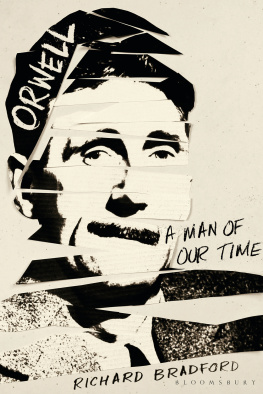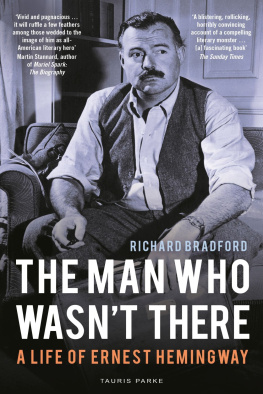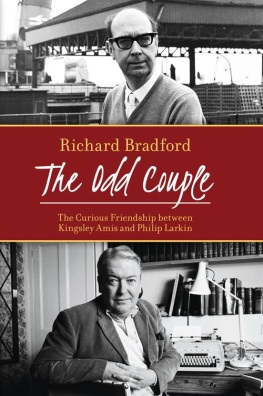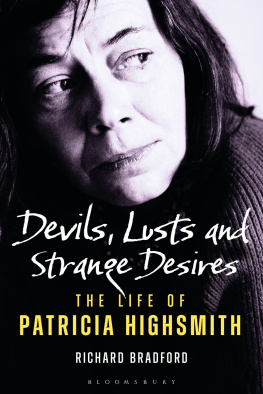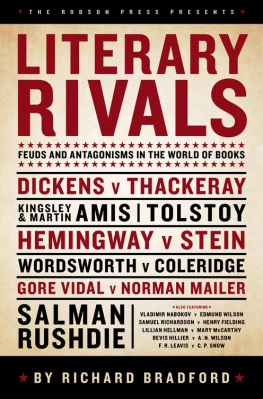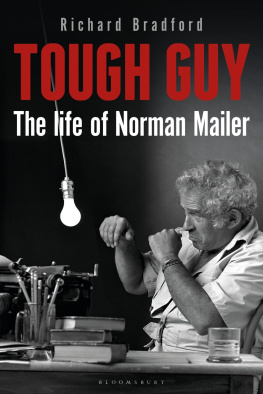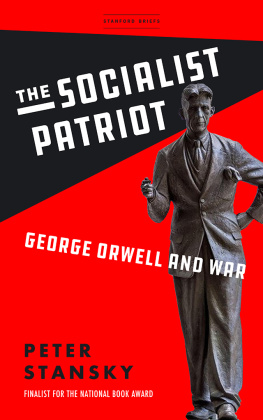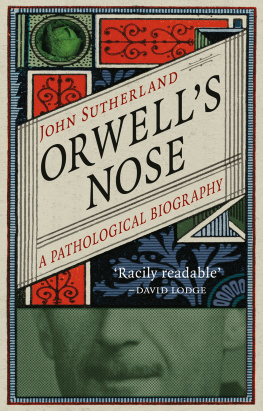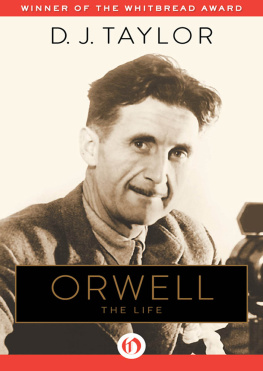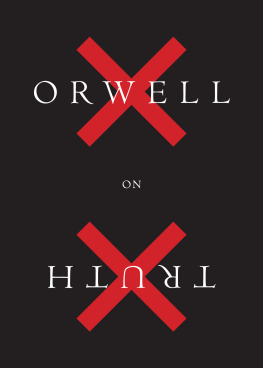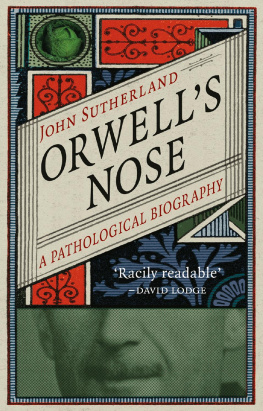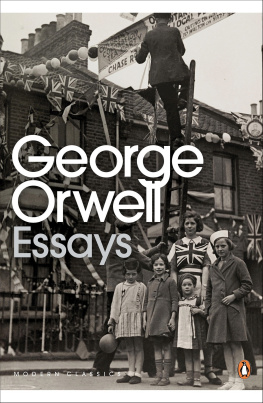
For Amy Burns

Contents
All quotations below are from texts by Orwell and others cited in the Bibliography. Orwell was of course born Eric Arthur Blair, but for the sake of convenience I will refer to him throughout as Orwell or George Orwell and to the married couple Eric and Eileen as the Orwells. In the preparation of the book thanks are due to the staff of the Library, Ulster University, and to Lisa Verner. Dr Amy Burns, an Orwell fan, has been of great help, as has D. J. Howells, for the same reason. My editor at Bloomsbury, Jayne Parsons, has been a gem.
Biographies, by their nature, are about the past, but this life of Orwell will be a little different. It will bring him into the present day and in so doing show that questions he asked of his generation remain unanswered and sometimes unaddressed.
No author can predict the future, yet Orwells talent as a foreseer is extraordinary. From the early 1930s onwards he was astute in picking out things about us that would endure and resurface many decades later: antisemitism especially on the extreme left; the toleration by the free world of authoritarian regimes, now because we need them economically; dim-witted materialism; populist politics; brainless nationalism; doublethink as the motor for political discourse that is, outright lying; the resurgence of seemingly endemic xenophobia; and, of course, Brexit. Most of the usual suspects werent alive when Orwell left us in January 1950 but he would not have been surprised by their appearances as players in revivals of his dramas: May, Trump, Johnson, Gove, Corbyn, Farage, Putin, Xi Jinping et al .
As a young man Orwell was antisemitic but, unlike almost everyone equally disposed, then and today, he took a step outside himself, recognised what he saw as evil, confronted its causes, and eventually repented. His atonement involved both self-loathing and a terrible recognition that many of his fellow countrymen were as bad as he had been. Anyone who believes that an occupied Britain would have protected its Jews should read his wartime journalism and reconsider. Orwells assessment of true antisemitism as a form of calculated doublethink tells us a good deal about the state of Corbyns Labour Party.
In Spain he was a hero, risking his life on numerous occasions leading attacks against Falangist trenches and machine-gun posts. He was shot in the throat and rewarded by being accused of treachery by the Soviets and their fellow travellers in the West. He and his wife Eileen went into hiding in Barcelona and escaped execution by the NKVD, the Russian secret police, by fleeing across the border into France. Briefly, he had experienced a version of what had been happening under Stalin for almost a decade: dissent leading to a show trial and execution.
Orwell loathed poverty but held in equal contempt the inflexibility of Marxism and communism as solutions; systems and ideologies which deny human beings the quixotic opportunity to live and think as they wish are, in his view, almost as cruel as inequality. Travelling among the English working classes he encountered men and women reduced almost to the condition of animals but, despite himself, he also detected a mixture of apathy and grim resignation; something quite different from the wild energy of revolutionary Catalonia. The proles of Nineteen Eighty-Four were born out of the sad figures of Down and Out in Paris and London and The Road to Wigan Pier. He expected that their conditions would improve, but he was not optimistic regarding a change in a collective state of mind. The cheers that greeted Mosley at a packed speech in Lancashire would be echoed decades later by followers of Farages Brexit Party. Most importantly, he diagnosed a state of introversion and xenophobia that transcends classes and is quintessentially English: Brexit existed long before the Common Market had been invented.
And of course we have doublethink, the use of language to distort objective reality. Today, it is not a tool of the Inner Party but rather a co-operative condition; we dont mind being lied to. But we have eradicated the nightmare of Nineteen Eighty-Four , havent we? On the contrary. We hold out our begging bowls, as global trading partners, to China, whose ruling Communist Party might well have made use of Orwells novel as an instruction manual.
Orwells novels of the 1930s Burmese Days, A Clergymans Daughter , Keep the Aspidistra Flying and Coming Up for Air are fine pieces of writing, but one also feels a tension between them and the three books published in the same period ( Down and Out in Paris and London, The Road to Wigan Pier and Homage to Catalonia ) which are equally compelling because they are based exclusively on lived experience. Once the Second World War broke out Orwell decided that truth-telling was more important than making things up. His journalism of the 1940s is angry and confrontational because it is based on facts he observed and reported, which virtually everyone else preferred to ignore. As such it was a rehearsal for his two best-known dystopian novels, Animal Farm and Nineteen Eighty-Four. Both epitomise his theory of what literature should do, laid out in Inside the Whale. It should not be a diversion, should not be a branch of the arts. It must show us at our worst and warn us of what we are capable of creating. The Cold War is over but we still need to heed his warning. Chinas version of Big Brothers totalitarianism is horrifying and not only because it is worse than anything Orwell imagined. In Orwells day the liberal left deluded themselves about the reality of Stalins regime. Today we know what happens under Xi Jinping and for the sake of economic expediency we dont care. Orwell said of his last novel: dont let it happen. Seemingly we now aid and abet it. We might suppose Orwell can rest easy in Sutton Courtenay churchyard given that weve prevented it from happening here and in the rest of the free world. But go to his descriptions of the ritual of the Two Minutes Hate, look at recordings of Trump conducting chants of Lock her up! Lock her up! and think again.
That Orwell became something of an oddball, a misfit, is not at all surprising given the first ten years of his life. During this period his father, Richard Walmsley Blair, was absent. He was alive and he was not separated from his wife, Orwells mother Ida Mabel (ne Limouzin), but Orwell only met him properly when he was nine years old and even then they switched places; Orwell would thereafter spend less than half the year in the family home after being sent to board at St Cyprians Preparatory School in 1911. Richard Blair had been an Opium Agent with the British administration in India since 1875 and he only returned to England permanently in 1912. He had met Ida, eighteen years his junior, in India in 1896 and married her the same year, after she had been jilted by a charming suitor of her own age. Richard had gone out to India in 1875, the year of Idas birth. In 1904, eight years after their marriage, Ida chose to move back to England with their two children. Marjorie, the eldest, was six years old and Eric Arthur Blair (Orwells birth name) was still a baby, having been born in a whitewashed brick bungalow in Motihari in 1903 less than twelve months before his mothers departure. Ida settled with the children in a comfortable, modestly appointed house in Henley-on-Thames and Richard visited his family there, briefly, in the summer of 1907. Their third child, Avril, was born in April 1908, roughly seven months after his return to India. It is likely that Orwell, then four years old, would have been introduced to his father but there is no record of how anyone in the household felt about a patriarch whose fleeting appearances seemed to involve little more than procreation. It is possible that Richard wrote to his son, but unlikely. Correspondence from a parent thousands of miles away is, generally speaking, retained, but none from Richard to Orwell survives and the latter never refers to any kind of communication between himself and his father during this period.

